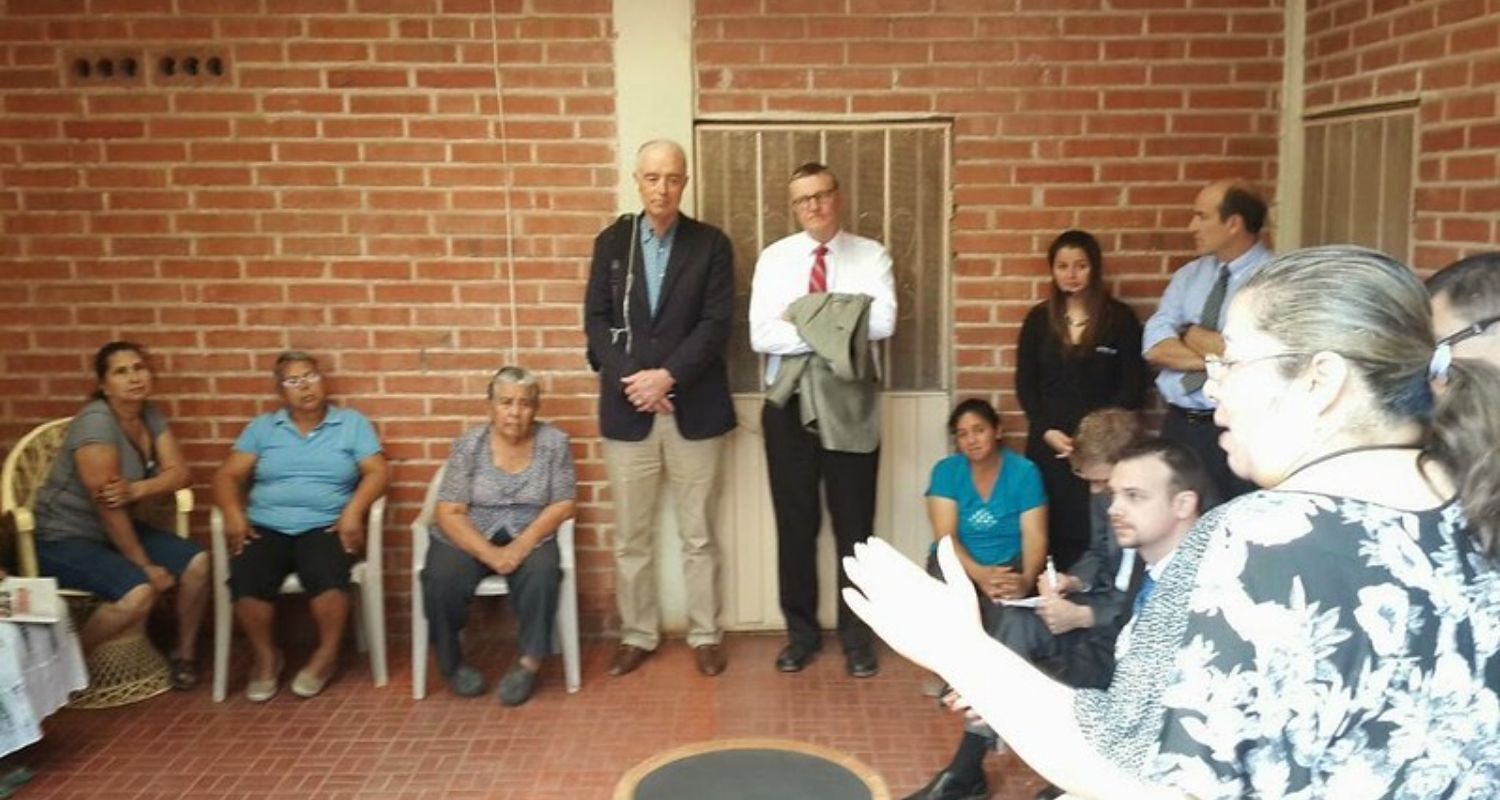March 29, 2015
Imagine being told that your house is no longer yours — even if the city had told you it was; even if your family had lived there for years; even if you paid for the land.
During their most recent visit, a group of U.S. lawyers working with ASJ met members of a Honduran community where that was the reality.
Meeting in a contested home in the neighborhood of Villanueva, the community members told the lawyers how a powerful woman named Reina had claimed a vast portion of the neighborhood’s land as her own, stealing money and land from residents. Roberto, a handicapped man who walks with a homemade cane fashioned from plastic piping and scraps of rubber, serves as the president of a community land rights council organized by ASJ and told of how Reina had him put in jail for standing up to her.
Some of the community residents had been forced out of their homes and then had their homes destroyed. That was the case for a single mother in the community named Adriana, who paid both the city government and Reina for the land, despite already living on it. Although Adriana made both payments and received a deed from the city, Reina knew that Adriana was still legally vulnerable without a land title. Reina went on to sell Adriana’s land to another person, who forcibly removed Adriana, destroyed her house, and built a fancy home on the land.
Not only was Adriana’s eviction unjust, it was also illegal, according to a 2004 law, which was supported by ASJ and passed by the Honduran government. Yet the Property Institute — the government agency tasked with titling land — has been ineffective in implementing the law.
The group of visiting US lawyers came with the intention of helping ASJ (formerly known as AJS) to investigate and monitor reforms in the Property Institute. It was the third trip in the past 18 months for the group, which is known as the International Property Institute Observatory (IPIO).
The 2004 law was passed to protect families in disputed lands from being evicted from their own homes by more powerful individuals. It was an important victory in protecting poor Honduran families, but in the years since its passage the Property Institute has been burdened by inefficiency and corruption to the point that the law is not enforced, and many families still live with the fear that their homes will be taken from them. It has taken the Property Institute 10 years to issue the amount of titles it should be able to issue in one year, and despite having an increased budget, the Property Institute grew less efficient in titling properties. At its 2012 rate, it would take the institute 177 years to title the country’s urban properties.
The IPIO, which is also collaborating with the organization Partners Worldwide, has been a helpful ally to ASJ by learning from the needs of poor communities in Honduras and then holding meetings with top Honduran government officials to seek reform and hold the Property Institute accountable.
Faced with external pressure, the Property Institute is trying to repair its system, and progress has been made. To help monitor this progress, ASJ developed an index of 10 indicators, which we’ll use to keep the institute publicly accountable. During the most recent visit of the IPIO, the Honduran president’s cabinet secretary held a public signing at the president’s office building for an agreement between ASJ, the IPIO, and the Honduran government. The agreement expressed the government’s intent to cooperate in the use of the index.
Additionally, new measures to combat corruption in the Property Institute and the accompaniment of a high-level official in the visit to Villanueva were new, encouraging developments in the IPIO’s most recent visit.
Still, a great deal of work remains to be done. Just the week before the IPIO’s visit, ASJ was invited to participate in the revelation that one local branch of the Property Institute had been caught participating in 466 crimes, including aiding in money laundering for drug traffickers. In addition, the fight continues for land rights and restitution in the community of Villanueva.
As one member of the IPIO said in the meeting with Villanueva residents, “We’ve come before to support you, we are here now, and we will come again.”
Indeed, the IPIO and ASJ will continue working alongside the members of this community, and we will continue helping to reform the Property Institute, in order to improve land rights across the entire country.
We will toil together, remembering the words that one woman from Villanueva told the IPIO as they concluded the meeting, “May God’s blessings fall on you, and together we’ll continue fighting for justice.”




















